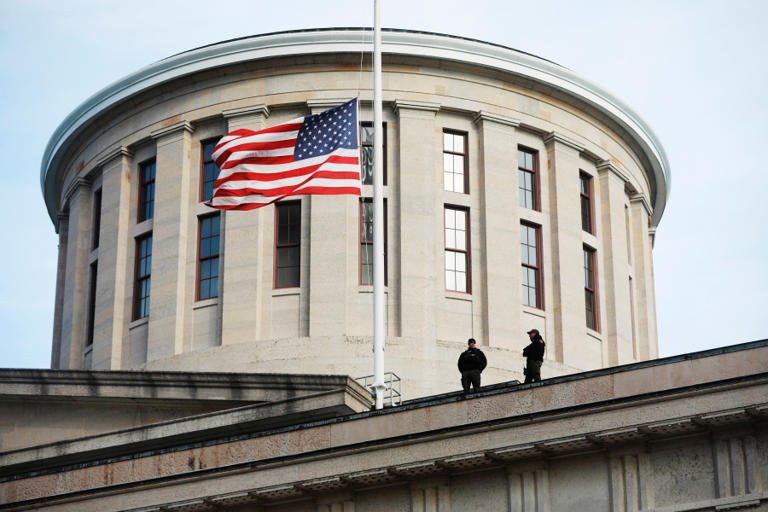August election on amending Ohio constitution approved by state senate
By Maeve Walsh
April 19, 2023

COLUMBUS, Ohio (WCMH) – Ohio’s Republican-controlled state Senate approved a measure Wednesday to bring back August elections for “special purposes,” a move that will likely set up a vote over how much support is required to change the state constitution and that could have a long-term effect on abortion rights.
The chamber made a two-pronged move. First, it passed a lawmaker-led initiative 27-6 requiring 60% of voter support – as opposed to a simple majority of 50% plus one vote – to enact a change to the Ohio Constitution. To fast-track the initiative, the Senate also approved a bill to hold an August special election in a 25-8 vote.
Ohio’s transgender sports ban: Athletes, LGBTQ+ advocates testify against proposed bill
Both measures must be approved by the Ohio House and later Gov. Mike DeWine to be enacted.
Senate Joint Resolution 2, nicknamed the Ohio Constitution Protection Amendment, was originally spearheaded by Rep. Brian Stewart (R-Asheville), who said the 60% threshold will protect the state’s founding document from being bought and abused by out-of-state and special interests.
“If any outside group believes its idea is worthy of inclusion in Ohio’s constitution, then it should be able to receive the widespread support that a 60% vote margin requires,” Stewart said in March. “Good ideas will pass.”
In a December letter to his fellow House Republicans, Stewart tried to drum up support for the proposal – also backed by Secretary of State Frank LaRose – by alerting his GOP colleagues to Democratic attempts to enshrine abortion rights into law and change the constitution’s redistricting rules.
“That’s just in 2023,” he wrote. “Almost every election cycle brings a new scheme from an outside special interest group – almost always from the Left – designed to buy on the statewide ballot what they can’t persuade us to do in the legislature.”
Opponents of the measure, including more than 200 advocacy organizations that signed a letter addressed to Republican leaders, described the proposal as an “undemocratic” power grab designed to curtail everyday Ohioans’ stake in politics.
The League of Women Voters, Ohio Voter Rights Coalition and others that signed onto the letter argued the process to amend the state’s constitution is not overused and already poses strict stipulations for citizens, “requiring hundreds of thousands of verified signatures and a strict geographical distribution across at least half of Ohio’s 88 counties.”
“Having only 40% of the citizens of Ohio be able to block what a majority of Ohioans want is undemocratic, unfair and tyranny,” Sen. Bill DeMora (D-Columbus) said Wednesday.
In a 25-8 vote, the Senate also approved Senate Bill 92 to restore August elections “for certain purposes” – just four months after the chamber voted to eliminate most of the late-summer elections given the $20 million price tag and low voter turnout in August 2022.
“This is legislative whiplash, and we do it really well here in Columbus,” Sen. Kent Smith (D-Euclid) said.
Placing the lawmaker-led, 60% threshold initiative on the August ballot could circumvent the Ohioans for Reproductive Freedom’s attempts to codify the right to an abortion into state law on the November ballot – a scenario that Senate President Matt Huffman said he would like to see.
“If we save 30,000 lives as a result of spending $20 million, I think that’s a great thing,” Huffman said last month.
The Ohio House’s iteration of the initiative, House Joint Resolution 1, passed out of committee Wednesday morning after several people, including AFL-CIO Ohio President Tim Burga and Columbus Building Trades Executive Secretary-Treasurer Dorsey Hagar, testified against it.
Introducing the initiative to coincide with a planned abortion ballot question is nothing but “chaos,” Burga said.
“When you try to game the system simply because you’re in power to try to get advantage on defeating an issue by changing 111 years of constitutional law, that’s wrong,” Burga said.
Mike Curtin, a former Columbus Dispatch reporter who represented Ohio’s 17th House District from 2013 to 2016, called HJR1 a solution to a nonexistent problem. In 2015, Ohio voters approved an amendment to ban monopolies and other special interest groups from using the state constitution for their own benefit.
“The sponsors have not cited one special interest of the current day they are trying to stop with this proposed amendment,” Curtin said. “That’s because there are none – Ohioans put a stop to them in 2015.”
On Wednesday, Huffman told NBC4 that if an initiative to enshrine abortion rights into the state constitution succeeds in November, Republicans and anti-abortion groups will “be back in ’24 fighting it, ’25, ’26 and on and on, which is why we need to have a 60% in the Constitution.”
After Committee Chairman Rep. Phil Plummer (R-Dayton) ended debate — leaving dozens of people without their allotted time to testify — the audience’s shouts of “Shame” echoed across the room. House Minority Leader Allison Russo (D-Upper Arlington) called Stewart’s motion to report the bill out of committee “a slap in the face.”
The House’s version of the August election bill, House Bill 144, awaits additional consideration in committee.
This piece was republished from MSN.